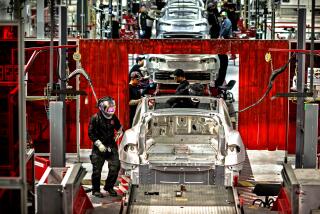Mitsubishi Lays Off 50 U.S. Middle Managers : Work force: Action affects 40 in Cypress, 10 in regional offices. Official says layoffs are a result of a corporate reorganization.
CYPRESS — A thick layer of middle managers was sliced from the Mitsubishi Motor Sales of America organization Wednesday as 50 people, or almost 10% of the auto importer’s U.S. work force, were let go.
The layoffs affected 40 people in the company’s corporate office in Cypress and 10 people in regional offices. No one at the rank of vice president or above was affected, and very few clerical workers were laid off, said Kim Custer, the company’s spokesman.
Mitsubishi Motor Sales, the Japanese auto maker’s domestic importing, distribution, dealer development and marketing arm, said the layoffs are not a result of poor sales in the United States but part of a permanent reorganization aimed at slashing costs and streamlining management.
Mitsubishi said the strength of the yen against the dollar was the primary reason for its decision. With each dollar worth fewer yen, it has become much more expensive to build cars in Japan for sale in the United States. Mitsubishi’s cost of doing business here, especially in the past two or three months, has also increased dramatically, Custer said.
The layoff mirrors another in late August by Mazda, a Japanese company with U.S. operations based in Irvine. Mazda Motor of America cut 175 jobs, including that of its top U.S. executive.
That company also blamed the strong yen and the weakening economy in Japan.
Automobile manufacturers around the world have been gearing up for increased competition--often by cutting payrolls.
Mercedes-Benz said in August that it would cut 21,000 jobs from its worldwide work force by the end of 1994. Nissan Motor Co. said it is reconsidering plans to expand a manufacturing plant in the United Kingdom that opened in 1984.
In July, Fountain Valley-based Hyundai Motor America laid off 30 employees at its headquarters. The Korean auto maker said its layoffs were driven by a restructuring designed to make the company more competitive.
And, last year, Daihatsu stopped exporting passenger vehicles to the U.S. market.
In an interview with The Times two weeks ago, Jay Amestoy, Mazda Motor of America’s vice president of marketing, predicted that other car companies would thin their management ranks.
“Chrysler has done it,” he said, “and I frankly believe we will see some of our Japanese competitors take these very same drastic steps in order to remain competitive.”
The layoffs do not represent a diminished focus on the American market, Mitsubishi officials said. They said the full line of vehicles and dealerships will remain here. Custer said Mitsubishi’s sales in the United States are up 5% compared to this time last year.
The decision to cut the corporate staff, to 496 employees nationally, was made here and not in Tokyo, Mitsubishi said.
“We decided several weeks ago to take the initiative in reviewing our staffing structure and identify those positions that are not absolutely critical to support the sales of our products,” said Richard Recchia, executive vice president and chief operating officer of the U.S. division.
Sales and marketing staff, he said, was consequently minimally affected.
One laid-off employee, a facilities manager, said he was led into a room when he reported to work on Tuesday. He said the room contained several managers and a security guard. “Yesterday, my manager terminated me, and today, he was terminated,” the employee said.
Some employees who have been with the U.S. operation since it opened 11 years ago, he said, were among those to go.
Mitsubishi said it is offering the former employees a severance package and job-placement assistance.
Custer said Japan’s economic troubles haven’t affected Mitsubishi’s U.S. operation as drastically as Mazda’s because it does not have cash flow problems.
Another difference between the two layoffs, Custer said, is that Mazda Motor of America had trimmed staff once before: The company had laid off about 200 people at the end of 1992, when it decided against building a new luxury car, the Amati.
“The way we’ve gone about this, it will only have to happen once,” Custer said. “Other companies have made a cut here, a cut there. We have done this in a way that we will never have to do it again.”
More to Read
Inside the business of entertainment
The Wide Shot brings you news, analysis and insights on everything from streaming wars to production — and what it all means for the future.
You may occasionally receive promotional content from the Los Angeles Times.










